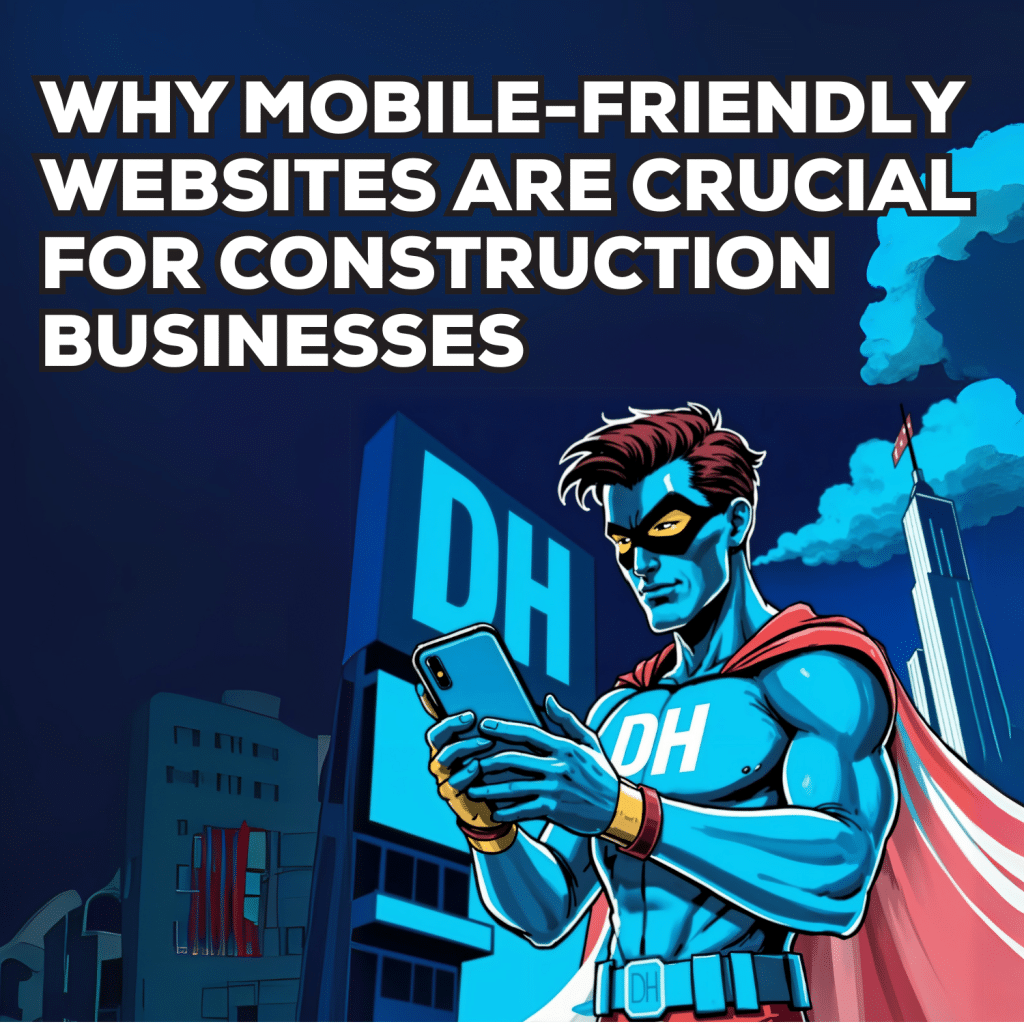If you’re a construction business owner still relying on a desktop-only website, you could be losing leads without even realizing it. In 2026, the majority of your potential clients are browsing on their phones. Whether they’re searching for “roof repair near me” during a lunch break or checking contractor reviews from the job site, mobile users expect fast, easy-to-navigate websites. If your site is hard to use on a phone or tablet, most visitors won’t stick around. Instead, they’ll head straight to a competitor who offers a better mobile experience.
A mobile-unfriendly website doesn’t just frustrate users. It also affects how you rank in search engines. Google prioritizes mobile-first indexing, meaning it evaluates the mobile version of your site before the desktop one when deciding where to rank you in search results. A site that fails to perform well on mobile could suffer from lower rankings, reduced traffic, and fewer conversions.
For construction companies, your website often serves as your first point of contact. Whether someone needs emergency plumbing or is researching general contractors for a home renovation, they’re likely doing it on their phone. If they can’t quickly find your services, see your past work, or contact you easily, you’ve missed an opportunity

Mobile-friendly websites allow users to:
- View project photos or portfolios without pinching and zooming
- Tap to call or request a quote instantly
- Navigate through services, FAQs, and testimonials smoothly
- Feel confident you’re a modern, reliable contractor
Start by testing your website on a variety of devices. Use tools like Google’s Mobile-Friendly Test or browse your own site using different screen sizes. Look for common issues such as tiny buttons, hard-to-read fonts, or layout problems. Work with a developer or web designer who understands mobile-first design principles, and prioritize page speed, simplicity, and ease of use.
Even small improvements, like enlarging buttons or reorganizing your content for shorter attention spans, it can make a big difference. The easier it is for potential clients to interact with your site on the go, the more likely they are to reach out and hire you.
Is your website turning away mobile visitors? Here’s why that matters in 2026.
Mobile Usage Stats in Construction
Construction business owners often underestimate how mobile their audience is. Here’s what the numbers say:
- Over 65% of local service searches are done via mobile (Source: Google).
- Construction keywords like “roof repair near me” or “concrete contractor” spike on mobile during weekends and evenings.
- Mobile-first indexing by Google means your mobile site is your real site, it’s what gets ranked.
In practice, this means when a homeowner is dealing with a leaky roof or a renovation need, they’re more likely to reach for their phone than sit down at a desktop. If your website is clunky on a phone, that user will bounce to a competitor whose site works better.
Moreover, construction services are often needed in real-time scenarios, on job sites, during inspections, or after hours. A responsive, well-functioning mobile website ensures your potential customers can reach you anytime, anywhere.
Consider how potential clients discover your business. They might see your truck, hear about your work from a friend, or stumble upon your social media ad. What’s their next step? A quick search on their phone. If they land on a frustrating experience, they won’t wait, they’ll move on.
Benefits of Responsive Design for Construction Business Websites
A strong online presence starts with a website that works well on every device. Whether your visitors are browsing on a smartphone during a lunch break, reviewing service providers on a tablet at home, or looking up your contact info on a desktop at the office, your website needs to deliver a seamless experience every time. This is where responsive design comes in.
Responsive design ensures your site automatically adjusts its layout, images, and navigation based on the device being used. It eliminates the need for separate mobile and desktop versions of your website and provides a consistent experience across all screen sizes.
For construction businesses, where trust, credibility, and local visibility matter, a responsive website isn’t just a nice-to-have, it’s essential.
-
Improves Lead Conversion
A responsive, mobile-optimized website removes barriers that could prevent a visitor from taking action. Click-to-call phone numbers, easy-to-fill forms, and well-organized service pages reduce frustration and increase the likelihood of a lead converting.
For example, if someone with a roofing emergency finds your site on their phone, they should be able to tap your number immediately or submit a request in seconds, without zooming, scrolling sideways, or hunting for contact details.
-
2Boosts SEO Performance
Search engines, especially Google, give ranking preference to mobile-friendly websites. Sites that are not responsive can fall several spots on search engine results pages (SERPs), significantly reducing your visibility. Since most construction customers are searching locally, appearing at the top of results for keywords like “kitchen remodeler near me” or “commercial contractor in [city]” is crucial.
Responsive design helps your site meet Google’s mobile-first indexing standards and improves your chances of being discovered by the right audience.
-
Enhances User Experience
Responsive websites provide a clean, consistent experience without the need to pinch, zoom, or scroll awkwardly. The layout flows naturally, and navigation menus adapt to smaller screens. This creates a smoother journey for your visitors, allowing them to find what they need faster.
Better user experience leads to lower bounce rates, longer session durations, and more trust, all of which contribute to stronger SEO and higher conversion rates.
-
Builds Trust with Prospects
In the construction industry, where competition is high and service quality matters, first impressions can make or break a lead. A well-structured, responsive website reflects your attention to detail and professionalism.
When your website functions smoothly on a mobile device, it sends a message to potential clients: you are current, capable, and serious about your business. On the other hand, a clunky, outdated site may raise doubts about how you handle projects or communicate with clients.
-
Increases Engagement
When visitors enjoy browsing your site, they’re more likely to stay longer, explore more pages, and take action. Responsive design encourages this by making content easy to digest on any screen. Whether a visitor is scrolling through your project gallery or reading blog content on home renovation tips, they are more likely to interact when the experience is smooth.
Higher engagement often leads to more quote requests, more phone calls, and ultimately, more signed contracts.
Think of your website as your digital storefront. If the entrance is hard to open or the signage is confusing, potential customers won’t step inside. The same principle applies to your online presence. If your website is difficult to use on mobile devices, you’re unintentionally turning away business.
Investing in responsive design ensures your website is clean, fast-loading, and intuitive. Qualities that help users find the information they need quickly and take the next step. In a competitive industry like construction, where trust and visibility are everything, responsive design can give you the edge you need.
Signs Your Site Isn’t Mobile-Ready
Many believe a “good enough” website for a construction business is enough to get leads for a construction company but there are key signs that your mobile UX is hurting your business:
- Tiny, unreadable text that requires zooming
- Buttons are too small or too close together, making it hard to click
- Images that overflow the screen or take too long to load
- Navigation menus that don’t adapt to mobile views
- Missing or broken links when viewed on a phone
- Lack of click-to-call functionality or map integration
Even more subtly, if mobile users are bouncing off your site quickly, or if no leads are coming from mobile, it’s time to investigate.
Pay attention to bounce rate, time-on-site, and mobile-specific form submissions. If all your leads are coming from desktop users, that’s a red flag.
Regularly testing your website from a smartphone, and using mobile analytics, can uncover these issues. You don’t need to be a developer to spot mobile red flags. Simply pull up your site on a few different devices and navigate as if you were a customer looking for help.
Run a quick check using Google’s Mobile-Friendly Test to see how your site stacks up.
How to Test and Improve Mobile UX
Mobile UX (user experience) is more than just design. It’s about how effectively your website serves users on smartphones and tablets. For construction businesses, most potential clients are browsing your site on the go during lunch breaks, site visits, or while comparing quotes from the couch. If your mobile experience is frustrating or confusing, they’re unlikely to stick around.
Optimizing mobile UX helps improve conversions, boosts SEO, and builds trust. Here’s a practical, step-by-step guide to help you test and enhance your mobile experience.
Step 1: Audit Your Current Site
Start by evaluating where your mobile UX stands. There are several tools that provide instant insights:
- Google Mobile-Friendly Test – Tells you if your site meets basic mobile usability standards.
- PageSpeed Insights – Analyzes your site’s mobile load speed and offers performance suggestions.
- Hotjar or Microsoft Clarity – Shows heatmaps and user session recordings so you can see where users tap, scroll, or get stuck.
Manual testing is just as important. Open your site on multiple devices (iPhone, Android, tablet) and try basic actions like calling, reading blog posts, or filling out your contact form. Ask a few friends or clients to do the same. What feels awkward? What’s slow or unclear?
Step 2: Focus on Speed
Mobile users expect fast performance. A slow website not only frustrates visitors but also negatively affects your Google rankings. Every second of delay reduces the chance of conversion.
Here’s how to improve speed:
- Compress images using tools like TinyPNG or ShortPixel without sacrificing quality
- Use a CDN (Content Delivery Network) to deliver files quickly across locations
- Minimize JavaScript and CSS to reduce load time
- Avoid large video files unless they’re optimized or lazy-loaded
Speed is not just about convenience. It directly affects bounce rates and how many leads your site can generate.
Step 3: Improve Navigation
Mobile navigation should be simple, intuitive, and fast to use. Complex menus or hard-to-find pages will cause frustration and increase bounce rates.
Here’s what to improve:
- Use a hamburger menu (three-line icon) to keep the header clean and user-friendly.
- Add a sticky header that stays visible while scrolling, with quick access to services or your phone number.
- Organize long content using collapsible sections (accordions).
- Avoid dropdown menus that require a mouse hover, as these don’t work well on touchscreens.
Good navigation ensures visitors can find your services, view past projects, and reach out without getting lost.
Step 4: Make CTAs Thumb-Friendly
Your calls to action (CTAs) are critical. If someone can’t easily tap your “Request a Quote” or “Call Now” button, they won’t bother.
Make your CTAs mobile-friendly by:
- Using large, high-contrast buttons that stand out against the background.
- Placing buttons within thumb-friendly zones, usually near the center or bottom-right of the screen.
- Keeping forms short and simple, just ask for Name, Service Type, and Contact Info.
- Enabling auto-fill and click-to-call functionality to make the process effortless.
If your CTA is hard to see, too small to tap, or buried in the layout, you’re likely missing leads.
Step 5: Partner with a Web Design Pro
If your site hasn’t been updated in the past three years, or if you built it using a basic DIY builder, a professional redesign could be the most efficient way to improve your mobile UX.
A professional web designer who understands construction websites can:
- Structure your site based on how real customers navigate and take action
- Design with mobile-first principles to ensure every layout works on all screen sizes
- Ensure ADA compliance, fast load speeds, and clean code for SEO
- Align your site with your brand, service areas, and customer expectations
Think of it as investing in a tool that works for you 24/7. A modern, mobile-optimized website is your digital sales rep, your portfolio, and your trust-builder all in one.
Mobile UX is no longer optional. It’s a core part of how your construction business gets discovered, builds credibility, and closes deals. Regularly test your site, simplify your navigation, and ensure visitors can take action easily. Even small improvements can lead to more calls, more quote requests, and more booked projects.
When your website works flawlessly on mobile, your business stands out, anytime, anywhere. Don’t settle for a website that only looks good on desktop. A responsive, mobile-optimized site ensures you’re visible, accessible, and competitive in 2026.
Book a free mobile website audit today and let Design Hero show you what’s possible. We specialize in building mobile-optimized websites for construction businesses just like yours.
Our Construction Website Case Studies
Frequently Asked Questions
A mobile-friendly website adjusts layout and content to fit any screen size, providing a smooth user experience on smartphones and tablets.
Most local customers search on mobile devices. If your site isn’t mobile-ready, you’ll likely lose those leads.
Use Google’s Mobile-Friendly Test tool or consult a web design expert for a full audit.
About the author

Nicholas Robb, Founder
The original Design Hero founder, solopreneur and marketing expert; Nick will help you supercharge your business success with a broad skill-set spanning a range of digital marketing fields.
If you want help growing your business...












